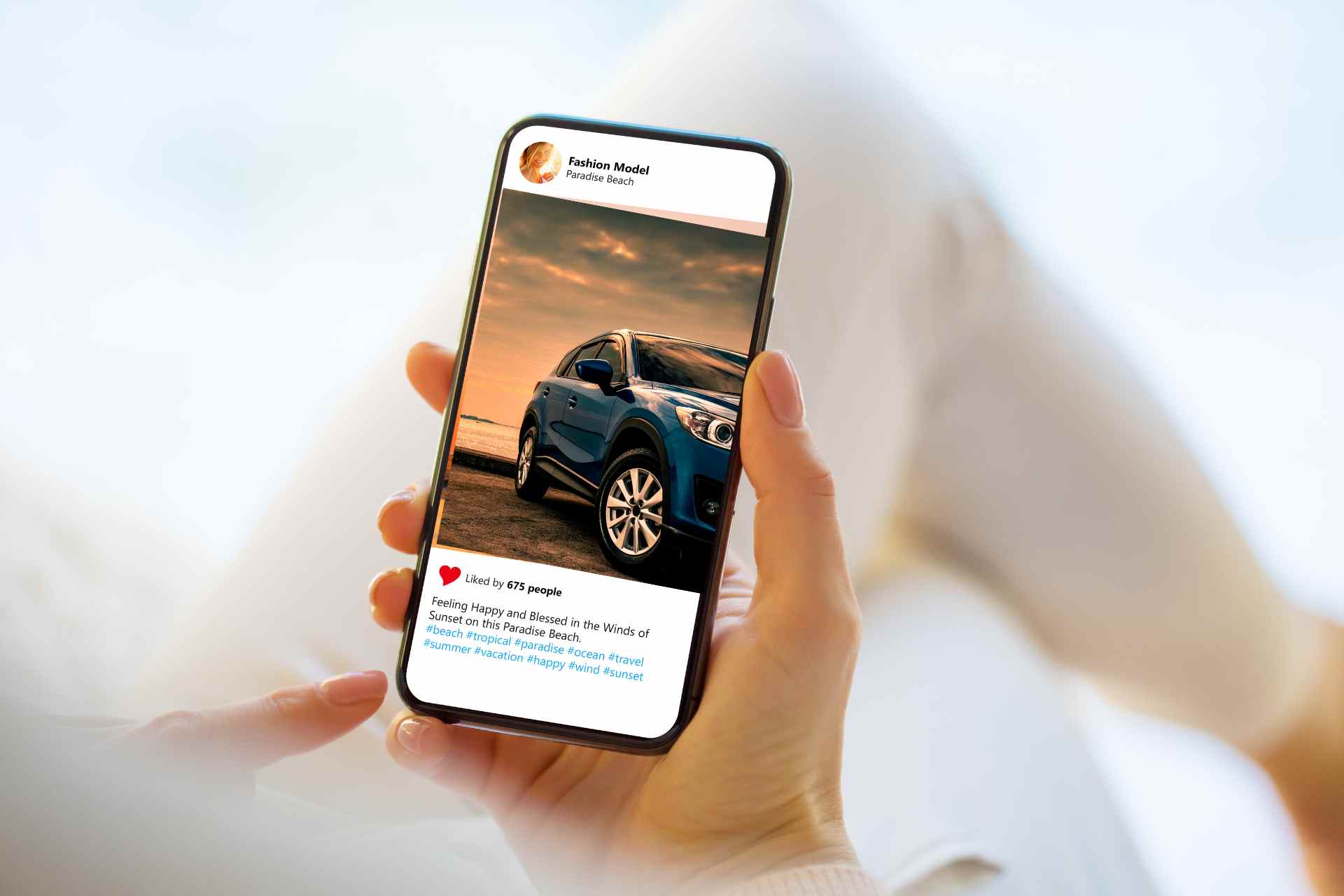
Table Of Contents:
- How does Automotive Social Media Marketing work?
- The Importance of Automotive Social Media Marketing
- The Impact of Social Media on the Automobile Industry
- The Role of Social Media in Car Dealerships’ Core Marketing Strategy
- Car Dealership Social Media Strategies
- Final thoughts
- FAQ’s
In today’s fast-paced digital landscape, businesses are continually seeking innovative ways to connect with their target audience. The automotive industry is no exception to this trend, and it has recognized the immense potential of social media marketing. In this article, we’ll delve deep into the world of “Automotive Social Media Marketing,” exploring how it works, its importance, its impact on the automobile industry, and the crucial role it plays in car dealerships’ core marketing strategies. So, buckle up, and let’s take a journey into the exciting realm of automotive social media marketing.
How Does Automotive Social Media Marketing Work?
Automotive Social Media Marketing, simply put, is the use of various social media platforms to promote and market automotive products and services. It involves creating and sharing content on platforms like Facebook, Twitter, Instagram, YouTube, Pinterest, and more. This content can take the form of text, images, videos, and interactive posts, all designed to engage and captivate the target audience.
The Importance of Automotive Social Media Marketing
Now that we’ve got a handle on what it is, let’s delve into why automotive social media marketing is so crucial for businesses in the automotive industry.
Adaptability
One of the most significant advantages of social media marketing is its adaptability. With the ever-evolving digital landscape, social media platforms continually update their features and algorithms. Automotive businesses can easily adjust their strategies to align with these changes, ensuring they stay relevant and visible to their audience.
Accessibility
Social media provides an accessible platform for businesses to connect with their audience. Unlike traditional advertising methods that may require significant financial investments, social media marketing allows even small automotive businesses to reach a vast audience at a relatively low cost.
The Human Touch
Automotive social media marketing adds a personal touch to the brand-customer relationship. By engaging with customers through comments, messages, and interactive content, automotive businesses can establish a more human connection, making their audience feel valued and heard.
Reputation Enhancement
Positive online interactions and a strong social media presence can enhance a company’s reputation. When potential customers see that a business actively engages with its audience, provides valuable information, and responds to feedback, it builds trust and credibility.
Traffic Increase on the Website
Social media platforms can drive traffic to an automotive business’s website through strategically placed links and engaging content. This increased traffic can result in higher leads and conversions, ultimately boosting sales.
Engaged Customers Better
Engagement is the key to building a loyal customer base. Social media allows automotive businesses to interact with their audience regularly, answer questions, address concerns, and provide updates, fostering a sense of community and loyalty.
Insights into Customers’ Needs
Social media provides valuable insights into customer preferences and needs. Through analytics and customer feedback, automotive businesses can tailor their products and services to better meet these demands.
Loyalty Increase for Customers
By consistently providing valuable content and excellent customer service on social media, automotive businesses can cultivate a loyal customer base that continues to choose their products and services over competitors.
The Cost-Effectiveness of Marketing
Compared to traditional advertising methods, social media marketing is highly cost-effective. It allows businesses to reach a broader audience for a fraction of the cost, making it an ideal choice for businesses of all sizes.
Sales Increased
Ultimately, the goal of automotive social media marketing is to boost sales. By effectively reaching and engaging with the target audience, businesses can convert leads into customers and drive revenue growth.
Search Engine Rankings Improved
Active social media presence can positively impact a business’s search engine rankings. Search engines like Google consider social signals (likes, shares, comments) when ranking websites, making a strong social media presence essential for online visibility.
Satisfaction of Customers Improved
Customers appreciate quick responses and personalized interactions on social media. When businesses actively engage with their audience, it leads to increased customer satisfaction, which can lead to repeat business and referrals.
Advantages in Competition
In a competitive market like the automotive industry, staying ahead of the competition is crucial. Social media marketing gives businesses a competitive edge by allowing them to showcase their unique offerings and connect with potential customers before their competitors do.
The Impact of Social Media on the Automobile Industry
Now that we’ve explored the importance of automotive social media marketing, it’s essential to understand how social media has impacted the automobile industry as a whole.
Industry Impact
Social media has revolutionized the way the automotive industry operates. Here are some key ways it has made an impact:
- Brand Visibility: Social media platforms have given automotive brands unprecedented visibility. Companies can now reach a global audience without the need for extensive advertising campaigns.
- Customer Feedback: Social media allows customers to provide feedback and reviews in real-time. This feedback is invaluable for automakers looking to improve their products and services.
- Product Launches: Social media is an ideal platform for launching new vehicles. Live-streamed events, teaser campaigns, and influencer collaborations generate excitement and anticipation.
- Customer Engagement: Automakers can engage with customers directly, addressing concerns, providing updates, and offering solutions. This direct communication builds trust and loyalty.
- Market Research: Social media platforms provide a treasure trove of data that automakers can use for market research. They can gather insights into consumer preferences, trends, and emerging markets.
- Competitive Analysis: Monitoring competitors’ social media activities allows automakers to stay informed about their strategies, product launches, and customer engagement tactics.
In essence, social media has become an integral part of the automotive industry’s marketing and communication strategies.
The Role of Social Media in Car Dealerships’ Core Marketing Strategy
Car dealerships play a pivotal role in the automotive industry, and social media has become an indispensable tool in their core marketing strategies. Let’s explore how car dealerships can harness the power of social media to drive success.
Car Dealership Social Media Strategies
Using Facebook as a Marketing Tool
Facebook is one of the most versatile platforms for car dealerships. It allows them to create business profiles, showcase their inventory, run targeted ads, and engage with customers through comments and messaging. Additionally, Facebook’s marketplace feature provides an excellent platform for selling vehicles directly to potential buyers.
Drive Sales with Twitter
Twitter is an excellent platform for real-time updates and promotions. Car dealerships can use Twitter to announce special deals, promotions, and limited-time offers. Utilizing trending hashtags and engaging with influencers can also amplify their reach.
Instagram Marketing for Millennials
Instagram is a visual platform that appeals to a younger audience, making it ideal for targeting millennials. Car dealerships can use Instagram to post high-quality images and videos of their vehicles, showcase behind-the-scenes content, and run visually appealing ad campaigns.
YouTube Video Marketing
Video marketing has gained immense popularity, and YouTube is the go-to platform for video content. Car dealerships can create engaging videos showcasing vehicle features, customer testimonials, and virtual test drives. These videos can be shared on other social media platforms to maximize visibility.
Consider Pinterest as a Social Media Channel
Pinterest may not be the first platform that comes to mind for car dealerships, but it can be a valuable asset. Dealerships can create visually appealing boards featuring their inventory, vehicle maintenance tips, and customer reviews. This platform can attract a different segment of the audience interested in DIY projects and automotive inspiration.
Social Media Storytelling
Storytelling is a powerful tool in social media marketing. Car dealerships can share stories about satisfied customers, successful vehicle purchases, and community involvement. These stories humanize the dealership and resonate with potential buyers.
Reviews on Social Media Are Important
Online reviews hold significant weight in the decision-making process for car buyers. Car dealerships should actively encourage satisfied customers to leave positive reviews on platforms like Google My Business, Facebook, and Yelp. Addressing negative reviews professionally and promptly is equally important.
Ensure Your Commitment Is 100%
Consistency is key in social media marketing. Car dealerships should maintain an active and consistent presence on their chosen platforms. This includes regular posting, engagement with followers, and staying up-to-date with industry trends.
Images and Videos of High Quality Should Be Posted
High-quality visuals are essential in the automotive industry. Blurry or unprofessional images can deter potential buyers. Car dealerships should invest in high-quality photography and videography to showcase their vehicles effectively.
Final Thoughts
In an age where digital connectivity is paramount, automotive social media marketing has emerged as a driving force in the industry. Its adaptability, cost-effectiveness, and ability to engage and connect with customers make it an invaluable tool for automotive businesses, including car dealerships.
As the automobile industry continues to evolve, embracing the power of social media is not an option but a necessity. Whether it’s building brand visibility, engaging with customers, or staying ahead of the competition, social media offers a plethora of opportunities for automotive businesses to thrive in the digital age.
So, whether you’re an automaker looking to launch your latest model or a car dealership seeking to boost sales, remember that the road to success in today’s automotive landscape runs through the digital world of social media.
FAQ’s
Social media plays a significant role in automobile marketing by providing a platform for automakers and car dealerships to connect with their target audience. It allows them to showcase their products, engage with customers, gather market insights, and build brand loyalty.
Automotive companies should use social media strategically by:
1. Creating engaging content that showcases their products and services.
2. Interacting with customers through comments, messages, and responses.
3. Running targeted ad campaigns to reach a wider audience.
4. Utilizing social media analytics to gather insights into customer preferences.
5. Building a consistent and authentic brand presence on various social media platforms.
6. Leveraging the power of storytelling to connect with their audience on a personal level.
7. Encouraging customer reviews and feedback to enhance their reputation.





